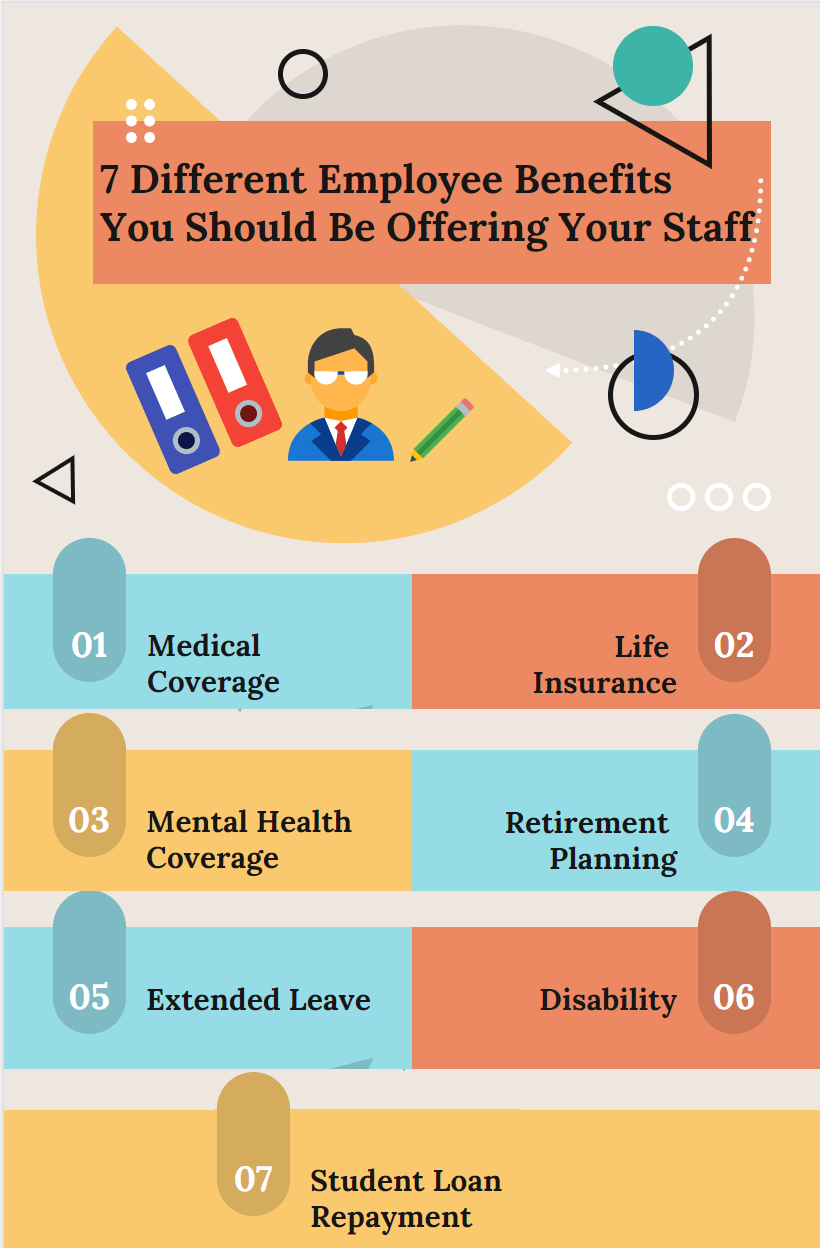7 Different Employee Benefits You Should Be Offering Your Staff
As well as recruiting the best talent, you must also learn how to retain the best talent. As a small business, competing with large corporations can often seem like an insurmountable task. But employee benefits can allow your business to stand out from the crowd and surpass your competition. While there are employee benefits that are widely available in business, there are other rare benefits like mental health coverage and student loan repayment that you can offer. Continue reading to familiarise yourself with a number of employee benefits you should be offering your staff if you aren’t already.
Table of Contents
What Are These 7 Employee Benefits?
1. Medical Coverage
Medical coverage is one of the most commonly offered employee benefits today. The level of coverage differs from company to company, but most organizations offer insurance that covers doctors’ appointments, regular check-ups, basic medical procedures, routine surgical procedures, and accidents or emergencies sustained at home or at work.
FSA for employees is an account that provides tax benefits to employees, with taxes deducted from their paychecks in advance to cover certain health or dependent care expenses. Employees can take advantage of this benefit by participating in the FSA at the beginning of a plan year and setting aside a certain amount of money. Health FSA covers medical expenses, prescriptions, and some medical supplies, while Dependent Care FSA covers eligible care expenses (for example, child care).
2. Life Insurance
Another employee benefit typically included on an employee benefits platform is life insurance. The most common policy is that of group-term life insurance. This is the name given to a single contract, or master contract, extended to cover the entire workforce for a prolonged period of time. It is usually effective for the duration of an employee’s contract and tends to be chosen as it costs less than a series of individual policies. It is possible, however, to be covered by group-term life insurance as well as an individual life insurance policy.
3. Mental Health Coverage
A growing number of employees are offering mental health coverage for their employees. Depending on the insurance plan, this can include psychologist appointments, psychiatrist appointments, behavioral and cognitive therapy sessions, grief, divorce and family counseling, and medication prescriptions. With an enhanced focus on mental health in the workplace in recent years, mental health coverage can be a determining factor for prospective employees.
4. Retirement Planning
Most organizations offer a wide range of retirement opportunities with available options differing from company to company. With pension auto-enrolment requiring all employers to automatically enroll employees into a workplace pension scheme, retirement planning is one of the most common employee benefits today. Examples include IRA plans, retirement plans, and employee pensions. Most employers also advise employees on how much to save, what to invest in, the benefits of pensions, alternative pension schemes, as well as any short-term and long-term goals.
5. Extended Leave
Extended leave accounts for prolonged periods away from work on medical grounds. Most employers offer extended leave for employees that are absent for a minimum of 15 consecutive days. In order to qualify, employees may be required to provide proof of their extended leave as well as documentation of any medical procedures that are scheduled to take place during this time.
6. Disability
Disability benefits cover an employee in the event of an accident or emergency that renders them ill or disabled and unable to work. Some organizations may extend this coverage to accidents or emergencies that occur outside of the workplace or outside normal working hours. This differs from employer to employer, but most policies include a basic form of short-term disability coverage.
7. Student Loan Repayment
Most former college or university students will enter the workforce with unpaid student loan debt. A growing number of employers offer student loan repayment benefits so employees can repay any outstanding debt in manageable monthly installments. The amount contributed each month differs depending on the total balance, minimum monthly payment amount, and employee salary. You can use SoFi student loan calculator or student loan payoff calculator to give you an idea of how much you’ll be paying each month and the payment period.
Conclusion: Retain Talent with Wide Range of Employee Benefits
Employee benefits can not only allow you to expand your existing workforce but can be the difference between attracting and retaining the top talent in your field. The range of employee benefits offered differs from company to company but, at the very least, should include medical coverage, life insurance, mental health coverage, retirement planning, extended leave, disability, and student loan repayment.
A dedicated Career Coach, Agile Trainer and certified Senior Portfolio and Project Management Professional and writer holding a bachelor’s degree in Structural Engineering and over 20 years of professional experience in Professional Development / Career Coaching, Portfolio/Program/Project Management, Construction Management, and Business Development. She is the Content Manager of ProjectCubicle.










